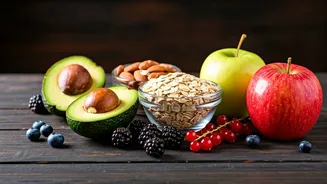Oats: Heart's Best Friend
Oats are a champion for heart health, playing a significant role in reducing cholesterol levels. They are rich in soluble fiber, especially beta-glucan,
which acts like a sponge, absorbing cholesterol in the digestive system and preventing its absorption into the bloodstream. Including oats in your daily diet can have a noticeable effect. A simple breakfast of oatmeal, for example, can be an excellent way to start your day. Consider adding fruits and nuts to enhance the flavor and nutritional value. The soluble fiber present in oats not only helps with cholesterol management but also promotes digestive health and helps control blood sugar levels. Furthermore, oats are a versatile ingredient that can be incorporated into various meals, from breakfast porridge to baked goods, making it easier to integrate them into your regular eating habits. Incorporating oats into your diet is a smart choice for overall cardiovascular well-being.
Nuts: Tiny Powerhouses
Nuts, particularly almonds, walnuts, and cashews, are packed with heart-healthy fats, fiber, and other nutrients that can help lower cholesterol. These nuts are a great source of monounsaturated and polyunsaturated fats, which are beneficial for reducing LDL (bad) cholesterol levels. Regular consumption of nuts has been linked to a reduced risk of heart disease. However, it's essential to eat nuts in moderation, as they are calorie-dense. A handful of nuts per day can provide significant health benefits without excessive calorie intake. Choose unsalted nuts to avoid added sodium, which can negatively affect heart health. Nuts also provide essential vitamins and minerals, contributing to overall health. Adding nuts to your diet can be as simple as snacking on a small portion between meals, sprinkling them on salads, or adding them to your yogurt. They are convenient, delicious, and an effective way to support your cardiovascular health.
Beans: Cholesterol Busters
Beans are an excellent food to include in your diet if you're looking to lower your cholesterol. Like oats, beans are rich in soluble fiber, which helps bind to cholesterol in the digestive system and prevent its absorption. They are also a good source of protein, making them a nutritious addition to any meal. There are numerous varieties of beans, including kidney beans, black beans, and lentils, all of which offer similar health benefits. Beans are incredibly versatile and can be used in soups, stews, salads, and as side dishes. They are also budget-friendly, making them an accessible option for everyone. Regularly eating beans can contribute to lowering LDL cholesterol levels, improving heart health, and promoting a feeling of fullness, which can help with weight management. Incorporating beans into your diet is a practical step towards a healthier lifestyle and is beneficial for your heart.
Fatty Fish: Omega-3 Benefits
Fatty fish, such as salmon, mackerel, and tuna, are rich in omega-3 fatty acids, which are crucial for heart health. Omega-3s help reduce triglycerides, a type of fat found in the blood, and can also increase HDL (good) cholesterol levels. The American Heart Association recommends eating at least two servings of fatty fish per week for optimal cardiovascular benefits. Cooking methods like grilling, baking, or steaming are preferable to frying, as they help to retain the nutritional value of the fish. These fish are not only beneficial for cholesterol management but also offer other health advantages, including reducing inflammation and improving brain function. Including fatty fish in your diet provides a tasty and effective way to support your heart health and overall well-being. Make it a regular part of your diet for the best results.
Avocados: Healthy Fats
Avocados are known for their high content of monounsaturated fats, which are beneficial for lowering LDL cholesterol levels. They are also a great source of fiber and various vitamins and minerals. Regularly consuming avocados can help improve overall heart health. You can easily incorporate avocados into your diet by adding them to salads, sandwiches, or smoothies. They can also be enjoyed on their own as a snack. Their versatility makes them an excellent addition to any meal. Besides their cholesterol-lowering properties, avocados are also known for their anti-inflammatory effects and their ability to improve the absorption of nutrients from other foods. Enjoying avocados as part of a balanced diet provides multiple health benefits, making them a delicious and heart-healthy choice.















